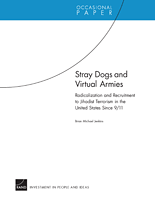 Since September 11, 2001, so-called “homegrown terrorists,” working alone or with others, have planned and in some cases implemented terrorist activities, contributed financial or other material support to others' terrorist activities, or become radicalized in the United States and then traveled to other countries to conduct terrorist activities directed against those countries or against the United States. This paper examines the cases of homegrown terrorism from 9/11 through 2010, highlights lessons learned from those cases that suggest actions for the future, and includes a chronology of numbers and case descriptions of terrorist events in the United States during that period. Most of the individuals involved are Muslim, but the numbers are small. A total of 176 Americans have been indicted, arrested, or otherwise identified as jihadist terrorists or supporters since 9/11. They were involved in 82 cases, a majority of which involve the actions of a single individual. Al Qaeda has increasingly used the Internet to build an army of followers. Many of the terrorists identified in this study began their journey online. However, al Qaeda has not yet managed to inspire its online followers to action. Few of the 32 locally hatched jihadist plots to carry out terrorist attacks in the United States since 9/11 got much beyond the discussion stage. Nevertheless, al Qaeda remains a threat. More terrorist attempts will occur. Traditional law enforcement, in which authorities attempt to identify and apprehend a perpetrator after a crime has been committed, is inadequate to deal with terrorists who are determined to cause many deaths and great destruction and who may not care whether they themselves survive. Public safety demands a preventive approach — intervention before an attack occurs. In addition to law enforcement, intelligence collection, and community policing, public reaction is an essential component of such preventive defense.
Since September 11, 2001, so-called “homegrown terrorists,” working alone or with others, have planned and in some cases implemented terrorist activities, contributed financial or other material support to others' terrorist activities, or become radicalized in the United States and then traveled to other countries to conduct terrorist activities directed against those countries or against the United States. This paper examines the cases of homegrown terrorism from 9/11 through 2010, highlights lessons learned from those cases that suggest actions for the future, and includes a chronology of numbers and case descriptions of terrorist events in the United States during that period. Most of the individuals involved are Muslim, but the numbers are small. A total of 176 Americans have been indicted, arrested, or otherwise identified as jihadist terrorists or supporters since 9/11. They were involved in 82 cases, a majority of which involve the actions of a single individual. Al Qaeda has increasingly used the Internet to build an army of followers. Many of the terrorists identified in this study began their journey online. However, al Qaeda has not yet managed to inspire its online followers to action. Few of the 32 locally hatched jihadist plots to carry out terrorist attacks in the United States since 9/11 got much beyond the discussion stage. Nevertheless, al Qaeda remains a threat. More terrorist attempts will occur. Traditional law enforcement, in which authorities attempt to identify and apprehend a perpetrator after a crime has been committed, is inadequate to deal with terrorists who are determined to cause many deaths and great destruction and who may not care whether they themselves survive. Public safety demands a preventive approach — intervention before an attack occurs. In addition to law enforcement, intelligence collection, and community policing, public reaction is an essential component of such preventive defense.
Tip of the Hat to Berto Jongman for the pointer.

 Gary Johnson: The Invisible Man Running for President
Gary Johnson: The Invisible Man Running for President


